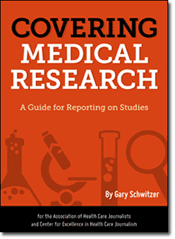The Internet and other media are abuzz with the news, published by BMJ yesterday, that the study published in The Lancet in 1998 by Dr. Andrew Wakefield linking autism to the MMR vaccine was fraudulent. The study of 12 children is frequently cited as proof that vaccines cause autism or play a part in the disorder, despite the fact that it was retracted. The BMJ calls the study “fatally flawed both scientifically and ethically” in a new editorial.
Covering Health has compiled some links to interesting reading on this subject, much of it specifically for journalists.
Ivan Oransky, on Embargo Watch, looks at an entirely different facet of the news with “Does a tweet break an embargo? A case study involving the BMJ, autism, vaccines, and an alleged hoax.”
Meanwhile, Gary Schwitzer, publisher of HealthNewsReview.org, writes that the Wakefield MMR/autism dismantling demonstrates what a difference one journalist can make.
CNN’s Anderson Cooper interviewed Andrew Wakefield last night about the charges that his study was flawed. And Brian Deer, the investigative journalist who reported the BMJ story, was interviewed on CNN’s World Report.
Update: Seth Mnookin, who has spent two years looking into vaccine scares, has written an interesting post about the topic, including his view that BMJ over-hyped its story, which almost certainly helped drive media coverage. Mnookin also appeared on CNN.
By sending out breathless press releases and prepping the worldwide media for a series of bombshell stories, the BMJ created the impression that this was fundamentally new news – and it wasn’t. We knew that Wakefield’s work wasn’t reliable or accurate on January 3 – and we still know that today. The stories that are currently running are not really all that different in tone or content than the stories that ran almost exactly a year ago, when a UK medical panel found there was sufficient evidence to justify stripping Wakefield of his right to practice medicine.
Covering Health posts
- Parikh examines media’s role in vaccine-autism link
- CDC: Nearly 1 percent of U.S. kids have autism
- Autism and vaccines: A failure to communicate
- Tribune: Lupron to treat autism is ‘junk science’
- Anger at radio host shapes autism performance
- CDC working to uncover cause of autism
- Newspaper: Landmark autism study used fixed data
- Review finds no link between vaccines, autism
Tip sheets
- Background on autism from Pauline A. Filipek M.D., director of the Autism Program for OC Kids Neurodevelopmental Center and associate professor of clinical pediatrics and neurology at the University of California, Irvine, School of Medicine.
- Investigating alternative treatments for autism: Trish Callahan & Trine Tsouderos, of the Chicago Tribune, wrote “Dubious Medicine,” a look at the world of alternative treatments for autism, treatments that are often risky and unproven.
Contest entries
- Dubious Medicine, Trine Tsouderos and Patricia Callahan, Chicago Tribune
- The Truth About Autism: Scientists Reconsider What They Think They Know, David Wolman, Wired
- Is it Autism?, Norine Dworkin-McDaniel, American Baby
Covering Medical Research
Learn how to analyze and write about health and medical research studies with AHCJ’s latest slim guide. It offers advice on recognizing and reporting the problems, limitations and backstory of a study, as well as publication biases in medical journals and it includes 10 questions you should answer to produce a meaningful and appropriately skeptical report. This guide, supported by the Robert Wood Johnson Foundation, will be a road map to help you do a better job of explaining research results for your audience.





